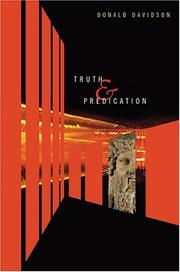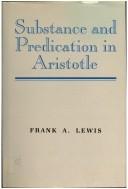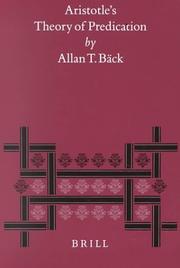| Listing 1 - 5 of 5 |
Sort by
|

ISBN: 0674015258 9780674015258 0674030400 0674030222 9780674030220 9780674030404 Year: 2005 Publisher: Cambridge, Mass. The Belknap Press of Harvard University Press
Abstract | Keywords | Export | Availability | Bookmark
 Loading...
Loading...Choose an application
- Reference Manager
- EndNote
- RefWorks (Direct export to RefWorks)
This brief book takes readers to the very heart of what it is that philosophy can do well. Completed shortly before Donald Davidson's death at 85, Truth and Predication brings full circle a journey moving from the insights of Plato and Aristotle to the problems of contemporary philosophy. In particular, Davidson, countering many of his contemporaries, argues that the concept of truth is not ambiguous, and that we need an effective theory of truth in order to live well. Davidson begins by harking back to an early interest in the classics, and an even earlier engagement with the workings of grammar, in the pleasures of diagramming sentences in grade school, he locates his first glimpse into the mechanics of how we conduct the most important activities in our life - such as declaring love, asking directions, issuing orders, and telling stories. Davidson connects these essential questions with the most basic and yet hard to understand mysteries of language use - how we connect noun to verb. This is a problem that Plato and Aristotle wrestled with, and Davidson draws on their thinking to show how an understanding of linguistic behavior is critical to the formulating of a workable concept of truth. Anchored in classical philosophy, Truth and Predication nonetheless makes telling use of the work of a great number of modern philosophers from Tarski and Dewey to Quine and Rorty. Representing the very best of Western thought, it reopens the most difficult and pressing of ancient philosophical problems, and reveals them to be very much of our day.
Mathematical logic --- Theory of knowledge --- Predicat (Logique) --- Predicate (Logic) --- Predikaat (Logica) --- Truth --- Vérité --- Waarheid --- Truth. --- Predicate (Logic). --- Predicables (Logic) --- Predication (Logic) --- Categories (Philosophy) --- Language and logic --- Logic --- Conviction --- Belief and doubt --- Philosophy --- Skepticism --- Certainty --- Necessity (Philosophy) --- Pragmatism --- Croyance (philosophie) --- Foi --- Prédication --- Prédicat (logique) --- Christianisme

ISBN: 0521391598 9780521391597 Year: 1991 Publisher: Cambridge Cambridge University Press
Abstract | Keywords | Export | Availability | Bookmark
 Loading...
Loading...Choose an application
- Reference Manager
- EndNote
- RefWorks (Direct export to RefWorks)
Metaphysics --- Aristotle --- Ousia --- Predicat (Logique) --- Predicate (Logic) --- Predikaat (Logica) --- Substance (Philosophie) --- Substance (Philosophy) --- Substantie (Filosofie) --- Matter --- Ontology --- Reality --- Predicables (Logic) --- Predication (Logic) --- Categories (Philosophy) --- Language and logic --- Logic --- Aristoteles. --- Aristoteles --- Contributions in metaphysics. --- Aristote --- Aristotile --- Aristotle. --- Contributions in metaphysics --- Aristotle - Metaphysics.
Book
ISBN: 3769690087 9783769690088 Year: 1979 Volume: 8 Publisher: München : Bayerische Akademie der Wissenschaften,
Abstract | Keywords | Export | Availability | Bookmark
 Loading...
Loading...Choose an application
- Reference Manager
- EndNote
- RefWorks (Direct export to RefWorks)
Predicate (Logic) --- Metaphysics --- Philosophy, Medieval --- Early works to 1800 --- Porphyry, --- Aristotle --- -Metaphysics --- -Philosophy, Medieval --- Medieval philosophy --- Scholasticism --- God --- Ontology --- Philosophy --- Philosophy of mind --- Predicables (Logic) --- Predication (Logic) --- Categories (Philosophy) --- Language and logic --- Logic --- Porphyry --- Aristoteles. --- Aristoteles --- Aristote --- Aristotile --- Porfirio --- Porphyrius Neoplatonicus --- Porphyrius Tyrius, Philosophus --- Porphyre --- Aristotle. --- Predicate (Logic) - Early works to 1800 --- Metaphysics - Early works to 1800 --- Porphyry, - approximately 234-approximately 305 - Isagoge --- Aristotle - Categoriae

ISSN: 00791687 ISBN: 9004117199 9004321098 9789004117198 Year: 2000 Volume: 84 Publisher: Leiden : E.J. Brill,
Abstract | Keywords | Export | Availability | Bookmark
 Loading...
Loading...Choose an application
- Reference Manager
- EndNote
- RefWorks (Direct export to RefWorks)
This book claims that Aristotle followed an aspect theory of predication. On it statements make a basic assertion of existence that can be more or less qualified. It is claimed that the aspect theory solves many puzzles about Aristotle's philosophy and gives a new unity to his logic and metaphysics. The book considers Aristotle's views on predication relative to Greek philology, Aristotle's philosophical milieu, and the history and philosophy of predication theory. It offers new perspectives on such issues as existential import; the relation of Categories 2 andamp; 4; the place of differentiae and propria ; the predication of matter; unnatural predication; and the square of opposition. It ends by comparing Aristotle's theory with current ones.
Predicat (Logique) --- Predicate (Logic) --- Predikaat (Logica) --- Prédicat (logique) --- Aristotle --- Predicables (Logic) --- Predication (Logic) --- Categories (Philosophy) --- Language and logic --- Logic --- Aristoteles. --- Aristoteles --- Aristote --- Aristotile --- Predicate (Logic). --- Prédicat (logique) --- Aristotle. --- Arisṭāṭṭil --- Aristo, --- Aristotel --- Aristotele --- Aristóteles, --- Aristòtil --- Arisṭū --- Arisṭūṭālīs --- Arisutoteresu --- Arystoteles --- Ya-li-shih-to-te --- Ya-li-ssu-to-te --- Yalishiduode --- Yalisiduode --- Ἀριστοτέλης --- Αριστοτέλης --- Аристотел --- ארסטו --- אריםטו --- אריסטו --- אריסטוטלס --- אריסטוטלוס --- אריסטוטליס --- أرسطاطاليس --- أرسططاليس --- أرسطو --- أرسطوطالس --- أرسطوطاليس --- ابن رشد --- اريسطو --- Pseudo Aristotele --- Pseudo-Aristotle --- アリストテレス --- Arisṭ
Book
ISBN: 9782801114209 2801114200 Year: 2008 Publisher: Bruxelles De Boeck-Duculot
Abstract | Keywords | Export | Availability | Bookmark
 Loading...
Loading...Choose an application
- Reference Manager
- EndNote
- RefWorks (Direct export to RefWorks)
Grammar, Comparative and general --- Predicate (Logic) --- Discourse analysis. --- Topic and comment. --- Predicate (Logic). --- Topic and comment --- 804.0-56 --- Frans: syntaxis; semantiek --- 804.0-56 Frans: syntaxis; semantiek --- Discourse analysis --- Predicables (Logic) --- Predication (Logic) --- Categories (Philosophy) --- Language and logic --- Logic --- Functional sentence perspective (Grammar) --- Predicate and subject (Grammar) --- Subject and predicate (Grammar) --- Theme and rheme --- Topic and comment (Grammar) --- Focus (Linguistics) --- Discourse grammar --- Text grammar --- Semantics --- Semiotics --- Subject and predicate --- Syntax --- Lexicology. Semantics --- French language --- Pragmatics --- Linguistics --- Philology --- Grammar, Comparative and general - Topic and comment
| Listing 1 - 5 of 5 |
Sort by
|

 Search
Search Feedback
Feedback About UniCat
About UniCat  Help
Help News
News